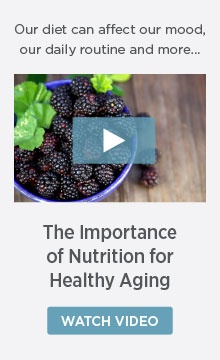
We’ve all heard the expression, “you are what you eat,” but have you really thought about what that idea entails? Stop for a moment and consider the last thing you ate. How is your body using that nourishment to fuel your every action and decision (including your ability to read this article!)?
Every single meal becomes the very essence of what you are. Your body transforms food into the cells and proteins that comprise your muscles, organs, and other tissue. For many years, scientists have studied how our diets affect our physical health and how vitamins, nutrients, and ingredients help our bodies stay healthy, especially as we age. But recent data shows that what we eat also shapes our mood and overall feeling of well-being.
For example, a 2018 research study from the NIH found that eating certain foods can actually lift people’s spirits and help individuals recover from feelings of depression, stress, and anxiety. That means your food choices can help you feel better not just physically, but mentally and emotionally!
The 'Brain-Gut Connection' in Improving Mental Health
Of course, multiple lifestyle factors and habits determine your mood, but as a society, we're starting to understand the crucial connections between our minds and what we eat. Scientists at Harvard even refer to the “brain-gut connection”: millions of nerve cells in your gastrointestinal tract are constantly sending signals across your nervous system and to your brain.
Furthermore, the gut contains the body’s microbiome, the community of microbes (good and bad bacteria) that keep us healthy. When your microbiome becomes unbalanced, your gut becomes inflamed, or your food isn’t digesting properly, your gut sends messages communicating displeasure and discomfort to your brain. This relationship provides the foundation for how your gut impacts your mood.
To help you make the best of this exciting research, we’ve put together a list of the most beneficial foods you can incorporate into your diet to help you feel better, inside and out.
6 Foods That Keep Your Gut Healthy
 Yogurt - Keeping the gut healthy starts with eating foods with high amounts of ‘good bacteria’ that protect your gastrointestinal tract, improve digestion, and prevent inflammation. The natural bacteria in yogurt contain probiotics that contain this kind of bacteria. Other foods to try: kefir, kombucha
Yogurt - Keeping the gut healthy starts with eating foods with high amounts of ‘good bacteria’ that protect your gastrointestinal tract, improve digestion, and prevent inflammation. The natural bacteria in yogurt contain probiotics that contain this kind of bacteria. Other foods to try: kefir, kombucha- Spinach - In 2016, researchers from Australia and the United Kingdom discovered that spinach contains a sugar that protects the gut from bad bacteria such as E. Coli and promotes the growth of good bacteria. It's also a proven source of fiber, which aids digestion, as well as nutrients that help slow cognitive decline. Other foods to try: leafy greens like kale, lettuce
- Broccoli - Broccoli packs a powerful punch of antioxidants and anti-inflammatory vitamins and nutrients, including Vitamin K, which is especially beneficial for older adults. Other foods to try: cauliflower, cabbage, kale, Brussels sprouts
- Bananas - In addition to being high in potassium, researchers at Harvard report that unripe bananas contain starch that promotes the development of beneficial microbes in the digestive tract. Eat bananas when they're pure yellow or not too brown to make the most of them!
- Blueberries - Berries play an important role in alleviating symptoms of gut inflammation, which aids digestion and overall gut health. Also, the natural pigment that makes berries so colorful has also been found to improve memory. A 2012 Harvard study found that consuming two or more servings of berries weekly delayed cognitive decline by up to two years. Other foods to try: strawberries, raspberries, blackberries
- Dark chocolate - A 2017 NIH study found that dark chocolate and cocoa contain ‘flavanols,’ a plant-based substance with anti-inflammatory and antioxidant effects, making them good for the gut (in small amounts). Taken together with regular cognitive exercise to build cognitive resilience, dark chocolate may also benefit overall cognitive brain function– an important consideration for older adults.
Eating well is just one component of maintaining your overall health and happiness, so be sure to exercise your mind and body in a variety of ways every day to ensure physical fitness and mental sharpness. The wonderful thing about choosing a healthy diet is that every day you will have the opportunity to improve on your goal. You don’t need to completely change how you eat, and you should always congratulate yourself when you make a healthy decision. Start small and try incorporating several of these foods into your meals on a semi-regular basis to make a plan you can stick to.

